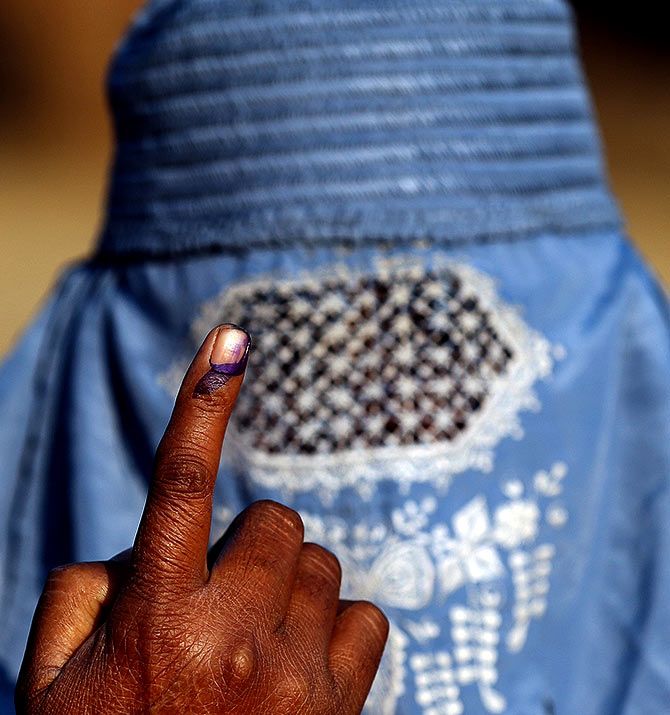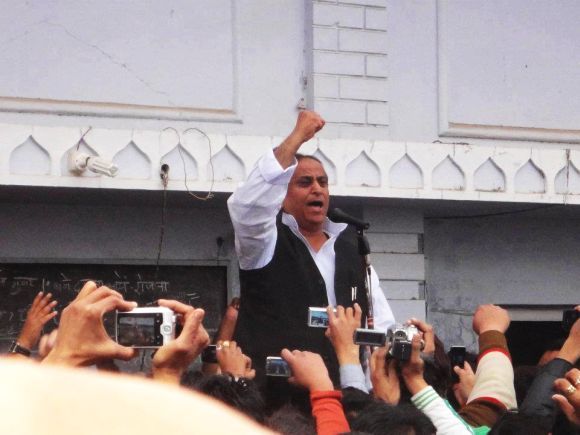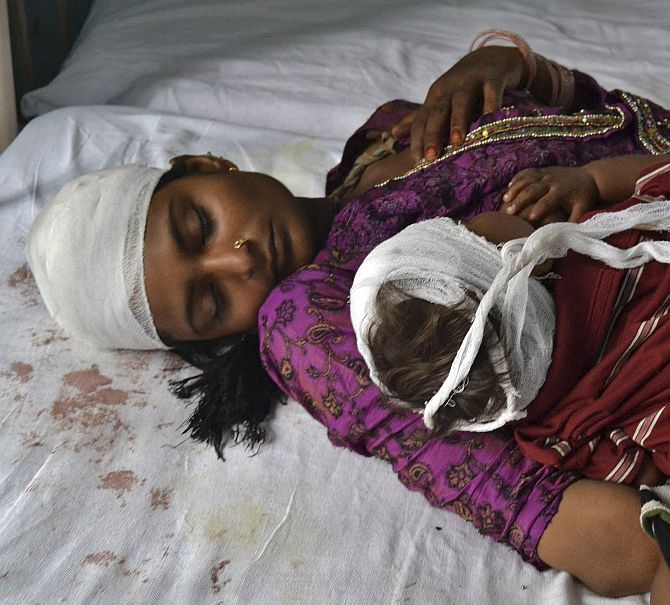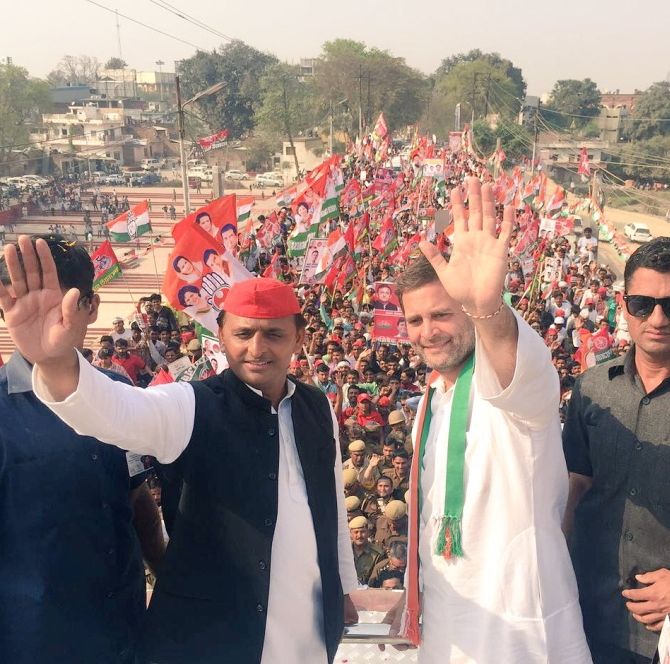'Compared to other social groups, managing the Muslim constituency has always been easier for the secularists.'
'Just some symbolic measures and window-dressing would keep the Muslim flock together.'
'Having been betrayed by all the supposedly 'secular' political parties, Muslims should turn into citizens without any ascriptive identity marks,' says Mohammad Sajjad.

If the Uttar Pradesh mandate 2017 has decimated a Yadav dynasty (Akhilesh Yadav), and if in the name of Dalit politics only a Jatav leader (Mayawati) has been written off, then why should a question arise about the future of Muslims in UP politics?
What is actually meant by 'secularism'?
What is really meant by the politics of minority appeasement or 'minority-ism', the BJP has consistently been accusing other parties of?
While interpreting the 2017 UP mandate, it seems there is relatively greater emphasis on communal polarisation, which, of course, is certainly there. However, we should not lose sight of other important factors.
Within the politics of social justice, among the OBCs, since long there has been lot of discontentment against the Yadav dominance.
Similarly, among a total of 66 Dalit communities, there has been tremendous resentment against the Jatav hegemony (in Bihar, it is the Paswans).
The Jatavs constitute around 56 per cent of the Dalits in UP, who are 21 per cent of the UP electorate.
Other numerically and geographically sporadic Dalit communities -- the Pasi, Dhobi, Kori, Khatik, etc -- have been living with the pain of acute marginalisation.
The quest for empowerment of these communities came to be termed as the 'third democratic upsurge.'
As the Yadav and Jatav dominance was perpetuated with the support of the Muslim electorates, they should have spoken out against this Yadav/Jatav politics of marginalising other Backwards/Dalits. Regrettably, the Muslims never did so.
In my last Rediff column (February 2, 2017), before commencement of the polls, I had written:
'It therefore remains to be seen:
(a) if there would really be a manifestation of the "third democratic upsurge" in the electoral outcome of 2017,
(b) if this upsurge would really penetrate the Muslims, and
(c) will it be, that the BJP would be ushering in the "third democratic upsurge" with which bulk of Muslims would also stand benefitted?'
In the UP assembly 2012 to 2017, as many as 68 Muslims were elected.
In 2007, there were as many as 56.
In 2017, despite all odds, as many as 25 Muslims have been elected, and significantly, as many as 84 finished second (three lost with less than 200 to 500 votes).
This in itself suggests that this mandate is not only about anti-Muslim polarisation.
This mandate is therefore, primarily, an expression of the revolt of non-Yadav OBCs, and non-Jatav Dalits against the above mentioned two dominant castes, as much as against perpetuation of the dynasty of the regional satraps of these castes.
The BJP, quite meticulously, did address this resentment by accommodating such marginalised groups of the OBCs (29 per cent) and Dalits, besides its core support base of the upper castes, who constitute 23 per cent of the UP electorate.
Besides, the undercurrent for the BJP was also due to the fast paced distribution of about 55 lakh LPG cylinders to BPL families in UP alone.
The central government scheme was implemented by the state, but the non BJP legislators remained callously unaware of the ambitious scheme. This is called 'Saffron Communism.'
A senior journalist asserts, "Modi was the factor, not the BJP. He is successful in conveying to the masses that he does have a desire to do something for them. People trust him and are prepared to give him time to deliver. Howsoever mistakenly, but the poor Hindus do think that de-monetisation has been a big discomfiture to the rich."

Then, why did the BJP resort to divisive and polarising tactics midway through the polls?
Partly, because it was not very confident about the durability of the social coalitions it had stitched, given its Bihar experience.
This anti-Muslim rhetoric got its receptivity for the fact that since these regional satraps grabbed (and stayed in) power with the help of Muslim votes, therefore, a fair degree of ire was there against them too.
In fact, the politics of Mayawati, Mulayam Singh Yadav, Lalu Yadav had become convenient with the votes of Muslims. Unlike the various segments of the Hindu electorate, the Muslims are not assertive, demanding, and claimants of equal co-shares in any sense.
Lalu's novice son could be made deputy chief minister (besides a ministerial berth for his elder son), ignoring very senior and much competent Abdul Bari, Shyam Rajak, for instance.
Lalu snatched a Rajya Sabha seat for his daughter Misa (who has hardly said anything significant in the House) rather than for his spokesperson, Professor Manoj Jha, who is more competent and wonderfully articulate too. Earlier, Rabri Devi's brothers were in the saddles of power.
In Bihar, the Nitish regime replaced Lalu Yadav's dynastic rule in 2005 with this social engineering of Ati Pichhrha (including Pasmanda Muslims) and the Maha Dalits.
Having kept the Yadav dynasty out of power for about a decade, there took place some dilution in anti-Yadav sentiments. Hence in 2015, the Nitish-Lalu-Congress alliance -- the Mahagathbandhan -- emerged victorious.
Even the Congress had to respond to the call of social justice by bringing out a Dalit, Ashok Chaudhry, as its face in Bihar.
Had Nitish been only a leader of his own caste, Kurmi, then even his good performances on governance and development could have been in vain electorally.
Even Nitish plays his politics of imposing Muslim leadership from above, almost in a similar way. For nomination to the Rajya Sabha, from among the Hindus, he will choose the enlightened and articulate retired diplomat Pavan Varma and journalist Harivansh, whereas from among the Muslims, he will prefer Ghulam Rasool Baliyawi and Kahkashan Parween, setting aside many competent people.
Given the large kinship network of the Mulayam dynasty, its perpetuation became even more loathsome for the people of UP.
Both Mayawati and the Mulayam dynasty could chase away other social groups with a confidence that the un-demanding, 'passive' electorate called Muslims would help them grab (and stay in) power.
Compared to other social groups, managing the Muslim constituency has always been easier for the 'secularists'.
Just some symbolic measures and 'window-dressing' would keep the Muslim flock together unassailably.
They won't shout much for education, health, roads, electricity, and won't assert much as an equal co-sharer in power.
Only emotive issues make them come out on the streets. Hence, mere defence of and assurances about their conservatism and dogmatism can ensure their votes.
Muslim leaders rarely emerge out of agitational/movemental processes. They, therefore, don't have much of a mass base of their own.
Hence, they can be propped up, and dropped, at the whims of the dynasts. Their co-option as well as shunting out is easier.
This has been harming the Muslims as much as Indian democracy as a whole.
Because of these dynasts, the quality of leadership among Muslims has been deeply flawed.
Look at a leader like Azam Khan. This demagogue has extracted a seat in the Rajya Sabha for his wife, and an assembly ticket for his son. He and his Samajwadi Party has not allowed the emergence of other leaders in Rampur.

How does this Muslim face behave politically?
He would issue divisive and provocative statements to trigger communal polarisation.
In November 2015, he spoke against the Rashtriya Swayamsevak Sangh. Kamlesh Tiwari of the Hindu Mahasabha retaliated with an affront against the Prophet.
The massive Muslim agitations across the country that followed in early 2016 were against Kamlesh Tiwari, whereas the Muslim agitations should have actually been directed against Azam Khan, the agent provocateur.
One must recall that Azam Khan enjoyed many ministerial berths in the Akhilesh Yadav cabinet, including being in charge of Muzaffarnagar affairs.
With wilful communalisation by the Akhilesh regime, in July-August 2013, beginning with suspension of the sub-divisonal magistrate of Noida, Durga Shakti Nagpal, eventually culminating into the Muzaffarnagar riots, the state government's failure in preventing and controlling the riots and horrifically perpetuating displacements of the victims did not ensue Muslim criticism against Azam Khan (and his regime).
Please see my Rediff columns of August 5, September 13, and September 16, 2013].
Akhilesh cunningly calculated that compensation to the victims will fetch enough Muslim votes for the SP, besides the resultant polarisation will push the Dalits and Jats away from the BSP and Lok Dal respectively.
The SP planned to contest the 2014 Lok Sabha with this politics of communal violence. This is how he intended to catapult his father Mulayam Yadav to the office of prime minister.
This game, of course, suited the BJP too, and the horrid game spun out of control of the Akhilesh administration. Little did the SP realise then that no other political formation can really outsmart the BJP on this turf.
The Muslim leadership and intelligentsia, if at all there is any, did not shout enough against this brazen and bloody game that was played out almost throughout the Akhilesh regime, which witnessed around 600 incidents of communal tension and violence. They did not even ask why Mayawati, too, was not speaking out.
Even on the issues of Rohith Vemula's suicide and the Una upsurge, and many atrocities against Dalits in UP itself, Mayawati may have said a few words in the Rajya Sabha, but she never took to the combative politics of street mobilisation in Uttar Pradesh. Why?
Again the same explanation will hold true. The politics of comfort and convenience -- that narrow but core support of the Jatavs, her own caste, plus a proportion of Muslim votes would help her get power.
She gave away tickets to around 100 Muslims this election and obtained some favourable statements for herself from the most regressive clergy. Why did not she feel like integrating many other social groups of Dalits and lower Backwards?
Why did not she nominate Professor Vivek Kumar, Kanwal Bharti, etc, to the Rajya Sabha?
Because unlike the Muslims, they won't remain a passive, non-demanding, unequal, subordinate ally! The 'satraps' had to guard against their 'sovereignty' being shared and parcelised.
This explains why these supposedly 'secular' parties remain so very content and confident. This is how the SP and BSP chose to overlook the discontent among the non-Yadav OBCs and non-Jatav Dalits respectively against their disproportionate dominance. They rather chased them away.
These regional satraps narrowed their support base, whereas the BJP embraced them and kept expanding its social base.
With Muslim votes the specific dynasties of these particular castes stay in power, and they get away with all kinds of tasks of governance and development.
This is how the extremely valuable Constitutional asset of India -- secularism -- got badly discredited; people got disillusioned with the disgustingly opportunistic abuse of the rhetoric of secularism.

They also seem to have emulated the art of perpetuating dynasty from the Congress.
Look at the latest politics of the Congress in the 2017 UP elections.
Rahul Gandhi was not asked by its electorate why promising, articulate leaders like Sachin Pilot, Jyotiraditya Scindia, Sandeep Dixit etc did not join the campaign in UP.
For long, in the political praxis of the non-BJP formations, the distinction between secularism and State-aided defence of Muslim conservatism has been getting more and more blurred.
Thus, the stake of a large number of Hindus in the idea and practice of secularism has woefully shrunk.
Now, in this kind of political scenario, the question that stares Muslims is: Why should they act as palanquin bearers of the Yadav/Jatav grooms?
As put aptly by a Muslim friend: "Hum log Yadav aur Jatav ke dulha dulhan ki doli ka bojh uthaaney waaley kahaar bana diye gaye hain."
What should we do now ask the thoroughly marginalised Muslims.
There is no easy answer to this question. Each measure proposed would meet with a lot of resistance and sharply contending debates will ensue.
Should the community conduct some self-introspection and soul searching?
An election involves an expense of almost a crore of rupees. Muslim electoral aspirants run for tickets to every party, and then expect that the entire community should vote en bloc only for their party.
Should the Muslims ask all these Muslim nominees of the SP, BSP, Congress, Lok Dal if they would mobilise these amounts for education and healthcare as readily as they do to contest elections?
The answer is a disappointing one.
Even the better off, affluent and educated segments of India's Muslims would not do so. Barring an insignificant proportion of honourable exceptions, even the NRIs among the Muslims are more generous in offering handsome donations to the political aspirants than making contributions towards education and healthcare.
I say this from personal experience. The loudest of NRI Muslim voices on social media sites among our contacts have not even maintained the courtesy of replying to our calls for such donations.
A Dubai-based Muslim NRI group would call a politician to felicitate him, but would hardly felicitate a genuinely selfless social worker having no ambition to dabble in murky politics.
In such a frustrating scenario, the best way for the Muslims is to concentrate on the difficult but do-able task of organising and streamlining their own traditional crafts and professions.
In times of crises, Muslims tend to overemphasise the aspect of education. Not that they lack educational infrastructure as much, rather that they are sorely lacking in providing quality education and motivating their wards to make it big in the realm of ideas and knowledge.
The madrasas, with community contributions, flourish. Mosques are refurbished with taller spires (minars) and bigger domes (gunmbads) whereas the government-aided Muslim minority academies remain hotbeds of mediocrity.
Having been betrayed by all the supposedly 'secular' political parties, Muslims should turn into citizens without any ascriptive identity marks.
Merging with the other citizens they may go on voting for their own limited choices without speaking for any of these parties.
They should be voting as confidentially/silently as they go to their toilets. Whenever the fellow citizens would shout and agitate (against the State) for education, healthcare, roads, electricity, law and order, price rise, employment, environment, gender justice, etc, they too should join such assertions, not as Muslims, but as citizens.
This could possibly be one way of diluting communal polarisation to some degree.
Educational and economic mobility will take care of their religio-cultural concerns.
As of now, in a mistaken belief, they have been prioritising their politics mainly around religio-cultural concerns.
This misplaced priority offers additional fodder to those who practise the politics of majoritarian hatred raising the bogey of 'Muslim appeasement'.
Even this choice would probably have mixed implications. Nonetheless, it is probably worth a try!
Mohammad Sajjad, professor at the Centre of Advanced Study in History, Aligarh Muslim University, is the author of Muslim Politics in Bihar: Changing Contours (Routledge, 2014) and Contesting Colonialism and Separatism: Muslims of Muzaffarpur since 1857 (Primus, 2014).
Please scroll down for more features on the UP elections results...











 © 2025
© 2025